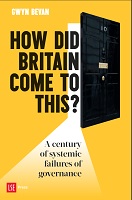How Did Britain Come to This?
A century of systemic failures of governance
Abstract
If every system is perfectly designed to get the results it gets, what is wrong with the design of the systems that govern Britain? And how have they resulted in failures in housing, privatisation, outsourcing, education and healthcare? In How Did Britain Come to This? Gwyn Bevan examines a century of varieties of systemic failures in the British state. The book begins and ends by showing how systems of governance explain scandals in NHS hospitals, and the failures and successes of the UK and Germany in responding to Covid-19 before and after vaccines became available.
The book compares geographical fault lines and inequalities in Britain with those that have developed in other European countries and argues that the causes of Britain’s entrenched inequalities are consequences of shifts in systems of governance over the past century. Clement Attlee’s postwar government aimed to remedy the failings of the prewar minimal state, while Margaret Thatcher’s governments in the 1980s in turn sought to remedy the failings of Attlee’s planned state by developing the marketised state, which morphed into the financialised state we see today.
This analysis highlights the urgent need for a new political settlement of an enabling state that tackles current systemic weaknesses from market failures and over-centralisation. This book offers an accessible, analytic account of government failures of the past century, and is essential reading for anyone who wants to make an informed contribution to what an innovative, capable state might look like in a post-pandemic world.
Keywords
British politics; Public policy; GovernanceDOI
10.31389/lsepress.hdbISBN
9781911712107, 9781911712121, 9781911712138, 9781911712114Publisher
LSE PressPublisher website
https://press.lse.ac.uk/Publication date and place
London, 2023Classification
Political science & theory
Public buildings: civic, commercial, industrial, etc


 Download
Download Web Shop
Web Shop